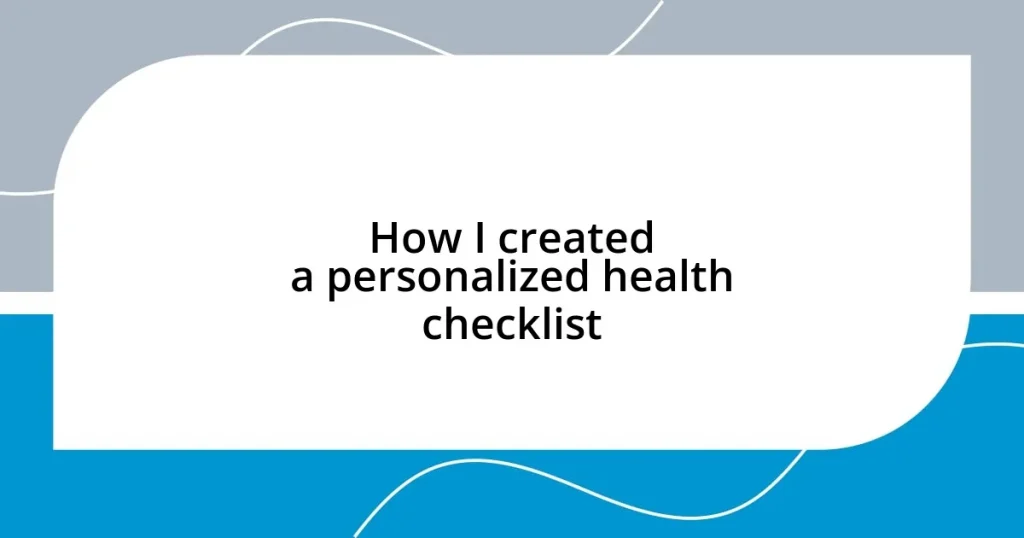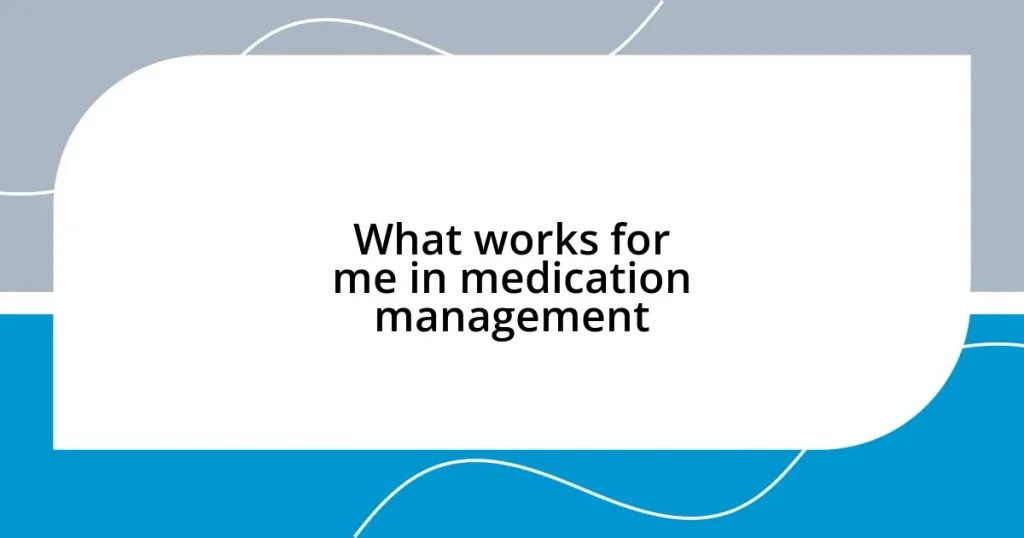Key takeaways:
- Understanding personal health goals requires introspection, leading to clearer and more attainable objectives.
- Assessing health needs and preferences helps tailor a personalized health checklist, enhancing motivation and sustainability.
- Monitoring progress and making adjustments, along with professional advice, can significantly improve the effectiveness of health strategies.
- Incorporating enjoyable activities and manageable habits fosters long-term engagement and enhances overall well-being.
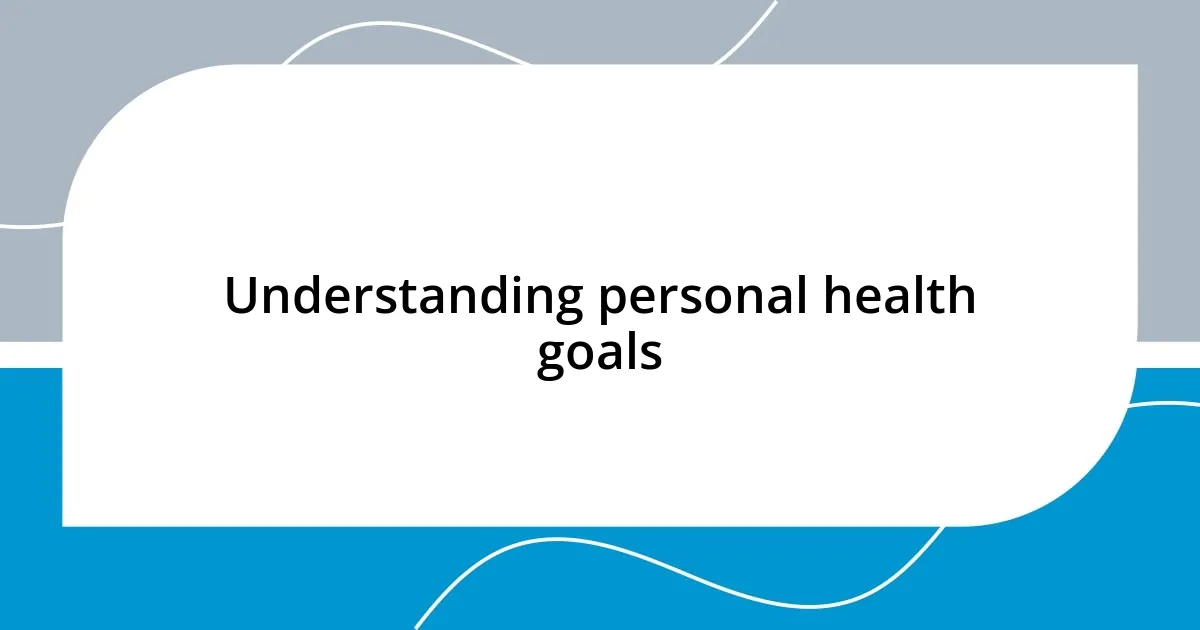
Understanding personal health goals
Understanding personal health goals is an incredibly personal journey. I remember when I first started thinking about my health; it felt overwhelming. I often asked myself, “What do I truly want to achieve?” This simple question became my guiding light, making my goals clearer and more attainable.
Setting health goals requires introspection and honesty. I had to dig deep and recognize what truly mattered to me—was it about feeling more energetic, maintaining a healthy weight, or improving mental clarity? Each answer revealed a layer of my motivations and desires. Have you taken the time to reflect on what drives your health ambitions? I found that understanding my ‘why’ made it much easier to stay committed.
It’s essential to make these goals specific and measurable. For instance, rather than saying, “I want to be healthier,” I transformed it into, “I will walk 30 minutes every day.” This clarity not only kept me focused but also made tracking my progress satisfying. Have you thought about how you can turn your aspirations into actionable steps? Believing in the power of attainable goals truly changed my perspective on health.
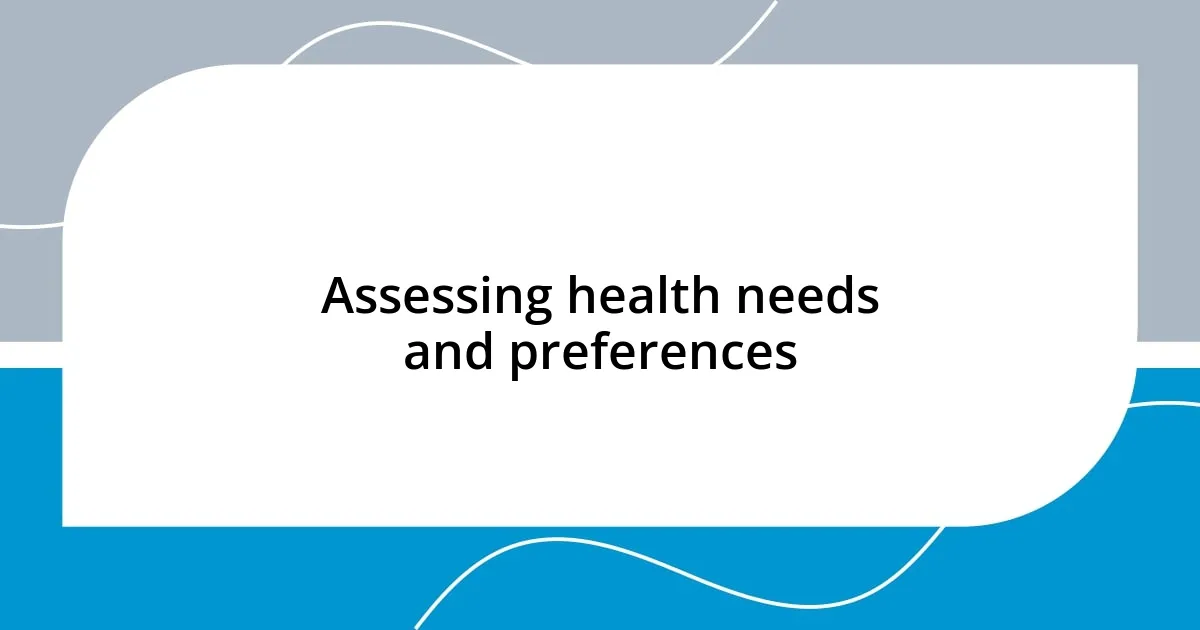
Assessing health needs and preferences
Assessing health needs and preferences is a crucial step in crafting a personalized health checklist. I remember sitting on my bed one afternoon, overwhelmed by all the health advice I’d read. It dawned on me that the first step was to figure out what truly mattered to me. Instead of trying to adopt every suggestion I found, I reflected on my daily habits, preferences, and even my emotional health. Have you ever stopped to think about how your lifestyle influences your wellness needs?
Through this reflection, I discovered that my preferences significantly shaped my health goals. For example, I realized I dreaded long gym sessions but loved my outdoor walks. By acknowledging this, I incorporated more enjoyable activities into my routine. It’s about finding what resonates with you. This approach not only made staying active pleasurable but also sustainable. What activities bring you joy? Identifying these can enhance your commitment to your health journey.
Moreover, I found that assessing my emotional health needs was just as important as my physical ones. I began to journal my feelings and noticed patterns tied to my stress and energy levels. This self-assessment helped me tailor my checklist to include mindfulness practices, such as meditation and deep-breathing exercises. How do you balance your emotional and physical health? Merging these aspects has been transformative for me and has led to a more holistic view of well-being.
| Health Needs | Personal Preferences |
|---|---|
| Physical Activity | Enjoyable movement (e.g., walking, dancing) |
| Dietary Choices | Daily meal prep and cooking |
| Mental Health | Journaling and mindfulness exercises |
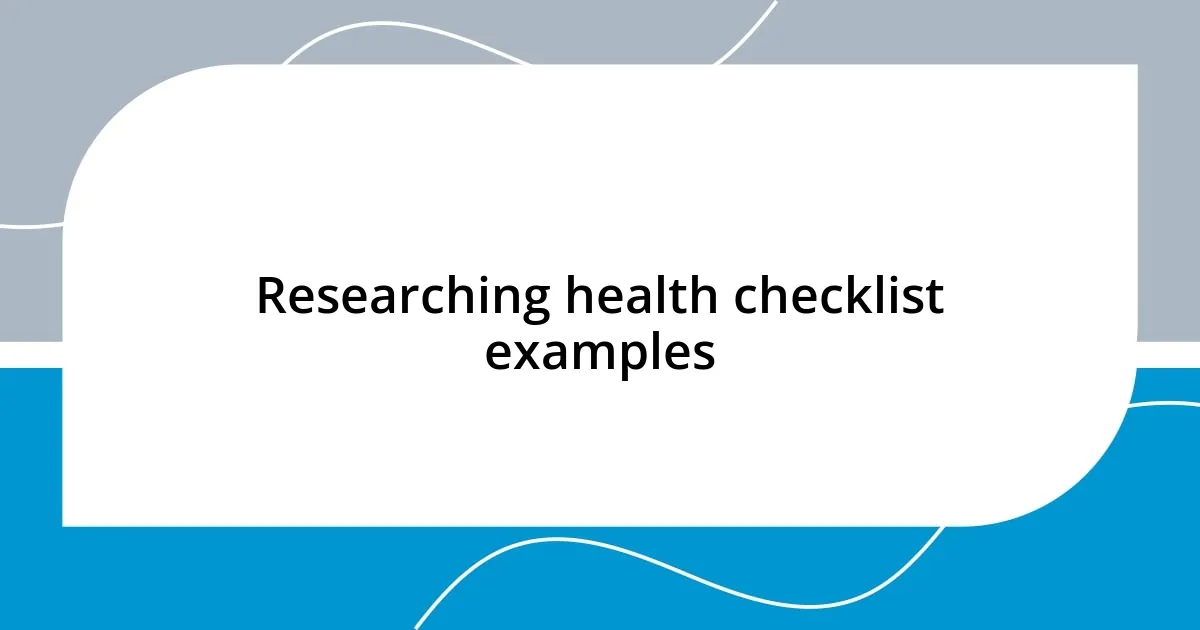
Researching health checklist examples
Researching various health checklist examples can provide valuable insights into what works best for different individuals. I remember my initial search involved an exciting yet daunting journey through countless websites, articles, and even health apps. Each example I found served as a potential puzzle piece in shaping my own personalized checklist. I quickly realized that these lists often vary significantly based on personal goals, lifestyle preferences, and even cultural factors.
Here are some key examples I encountered during my research that greatly inspired me:
- Fitness Milestones: Checklists often include specific targets like achieving a certain number of steps or workout sessions per week.
- Nutritional Goals: Many examples highlight daily water intake, fruit and vegetable servings, or meal planning.
- Mental Well-being: Some checklists incorporate mindfulness goals, such as daily reflections or practicing gratitude.
- Routine Health Check-ups: These lists might remind individuals of necessary appointments, like dental, vision, or annual physical exams.
Connecting these examples to my personal journey helped me curate my checklist more effectively, blending tried-and-true strategies with my unique experiences. Researching felt less like a chore and more like gathering tools for my own wellness toolbox, each piece encouraging me to take control of my health.
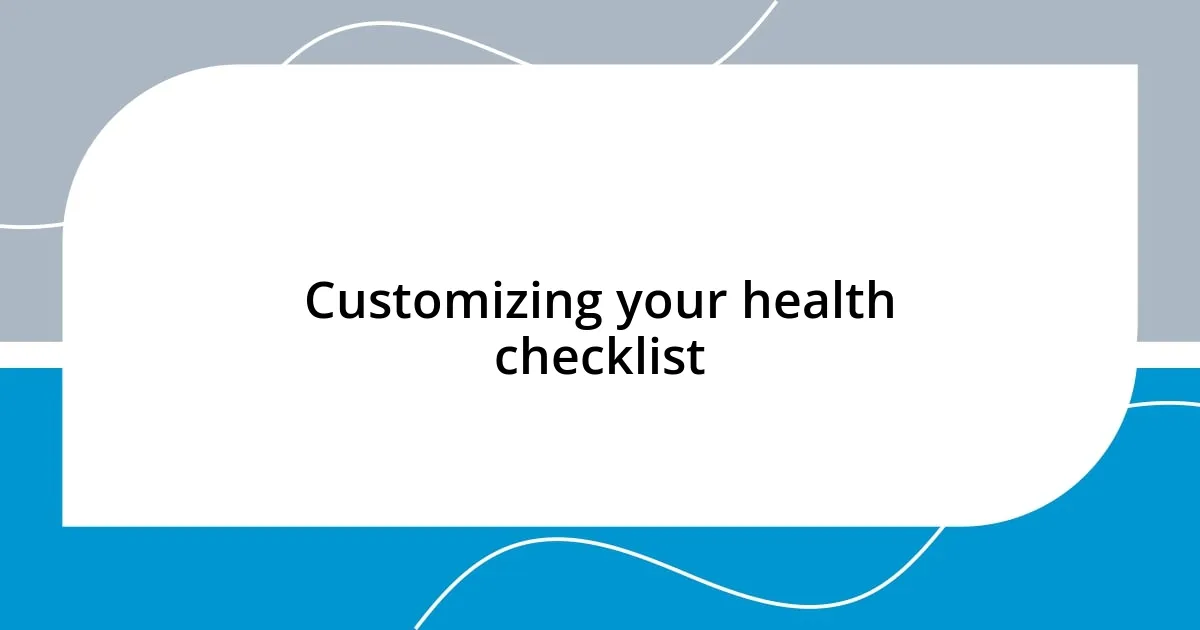
Customizing your health checklist
Customizing my health checklist was more than just adding items; it was about creating a roadmap unique to my life. I started by listing out the different dimensions of my health—physical, emotional, and social—and then I asked myself, “What do I truly want to achieve?” I quickly discovered that vague goals didn’t motivate me. Instead, I set specific, actionable steps, such as aiming for three home-cooked meals a week or dedicating time for a weekly catch-up with friends. How do you gauge what success looks like for you?
As I navigated through this journey, tracking my progress became a motivational tool in itself. I remember the first time I checked off a week’s worth of planned walks; it sparked a sense of accomplishment that pushed me to keep going. I adapted my checklist frequently, learning to listen to my body and mood. One day, I would feel energized and add a spontaneous yoga session; another day, I might need to focus on rest. I’ve realized that flexibility is key. Can your checklist evolve with you?
Another key aspect of customization involved incorporating my favorite activities into my routine, rather than forcing myself to do things I dreaded. For instance, while I had cycled through different workout trends that didn’t stick, integrating dance classes once a week transformed my fitness journey. It felt less like exercise and more like joy! How do you make your health journey enjoyable? Finding that balance is vital for maintaining long-term engagement and passion for your health.
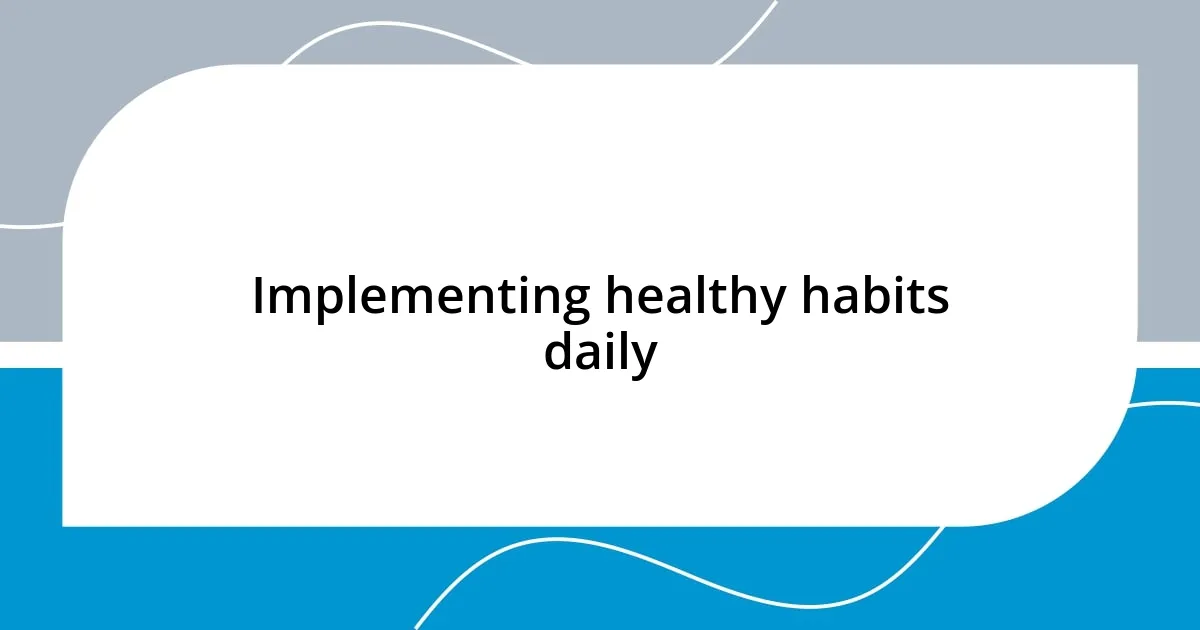
Implementing healthy habits daily
Adopting healthy habits daily can feel overwhelming, but I’ve found that breaking them down into manageable steps is crucial. For instance, I set a goal of drinking a glass of water each morning as soon as I wake up. It seems simple, but over time, this tiny habit has transformed my hydration levels and prompted me to consciously make healthier choices throughout the day. Have you ever experienced a small change lead to a big impact?
Another habit I integrated is dedicating ten minutes each afternoon for a quick stretch session. Initially, I thought it was just a way to get up from my desk, but it has become a moment of mindfulness that re-energizes my focus. I’ll never forget the first day I did this and felt a wave of clarity wash over me. It’s these moments that remind me of the importance of self-care. How do you refuel during your busy day?
Meal prepping has also been a game changer for me. I recall how chaotic my evenings used to be, scrambling to figure out what to eat while fighting evening fatigue. By investing a couple of hours on weekends to prepare healthy meals, not only do I save time, but I also ensure I’m eating what I truly enjoy. The satisfaction of enjoying a delicious, healthy meal without the stress of last-minute decisions is a relief. What simple routines could you adopt to streamline your meals?
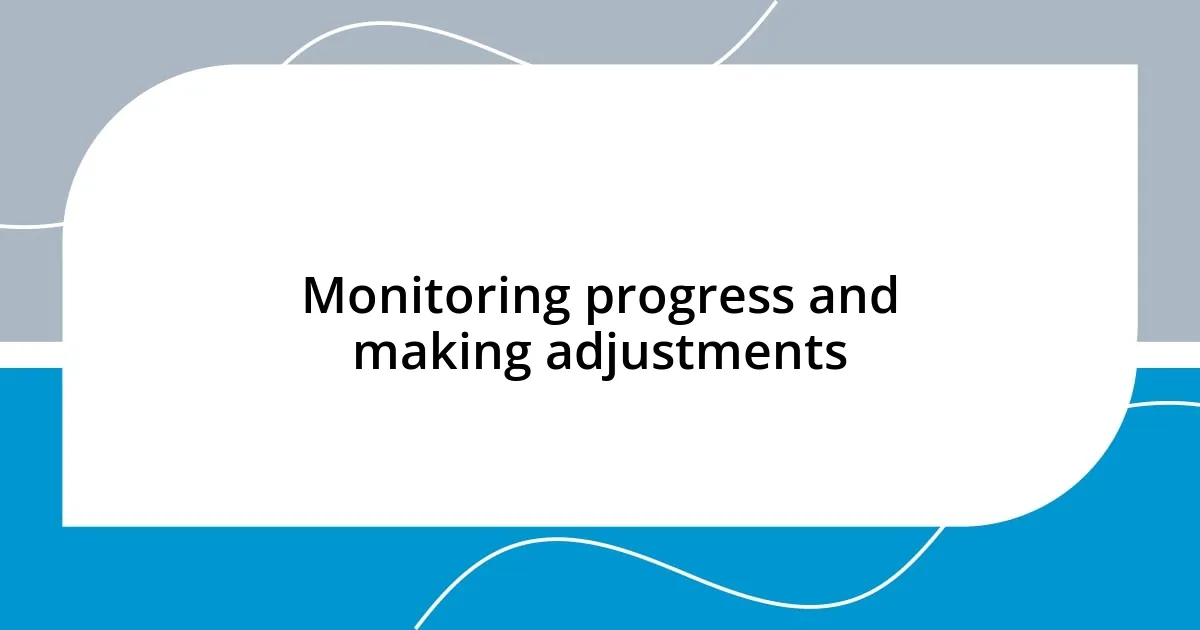
Monitoring progress and making adjustments
Tracking my progress has been a game changer. I kept a journal where I documented my feelings each week and noted which activities energized or drained me. When I look back, it’s fascinating to see patterns emerge—certain workouts uplifted my spirits while others left me fatigued. Have you ever noticed a shift in your motivation? Recognizing these trends has allowed me to adjust my planning and prioritize self-care.
Sometimes, I found that a simple tweak could make all the difference. For example, there were weeks when my energy levels dipped, and I needed to dial back on intense workouts. Instead, I would swap in lighter activities, like gentle walks or stretching. This shift wasn’t just practical; it was emotionally freeing to know I didn’t have to push through exhaustion. Have you adjusted your routine based on how you truly feel? I learned that paying attention to my body can enhance my overall experience.
As I refined my checklist, I began incorporating a monthly review session to evaluate my progress and set new intentions. I remember the first time I sat down for this process; it felt almost like a spa day for my mind. Questions like “What worked?” and “What didn’t?” provided clarity, guiding my next steps. The chance to celebrate my wins—big or small—boosted my confidence and reinforced my commitment. How often do you reflect on your health journey? I find that moments of reflection can inspire the most meaningful adjustments.
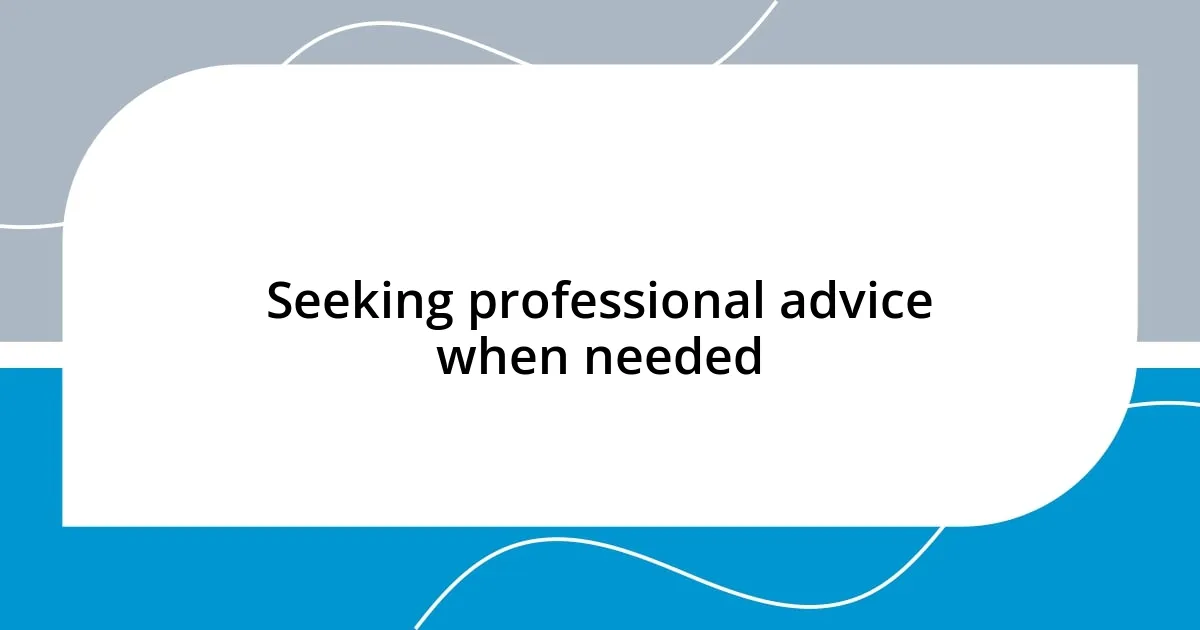
Seeking professional advice when needed
Seeking professional advice when navigating my health journey was a pivotal step that I can’t overlook. There was a time I struggled with persistent fatigue that just wouldn’t budge. After trying various self-help strategies with limited success, I finally decided to consult a healthcare professional. That moment of reaching out was daunting, but it led to insights that genuinely changed my approach. Have you ever hesitated to seek help, only to find it’s what you truly needed?
Having a professional’s perspective added layers of clarity and validation to my experiences. For example, I was surprised to learn about the importance of micronutrients in my diet, which I hadn’t considered before. A simple blood test revealed that I was low in iron, and thanks to the guidance I received, I adapted my meal plan accordingly. It was an eye-opener! How often do we overlook key details in our health, thinking we’ve got it all figured out?
Embracing professional advice not only empowered me, but also created a support network that I cherish. I fondly recall my first nutrition workshop—listening to an expert discuss food diversity opened my mind to new culinary possibilities. I left feeling energized and determined to experiment in the kitchen, reminding me that sometimes we should lean on others’ expertise. What’s stopping you from seeking that expert guidance? It might just spark a transformation you didn’t see coming.











